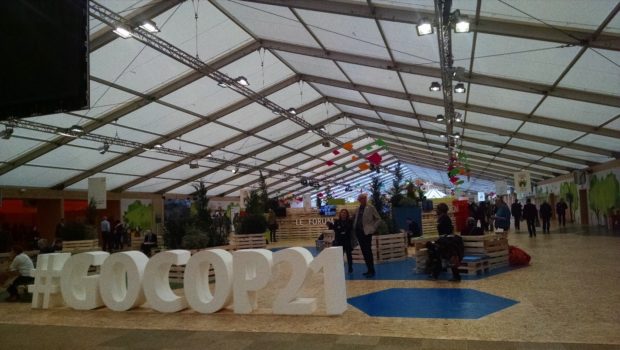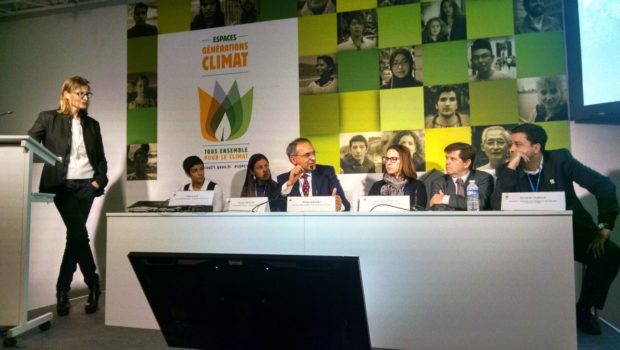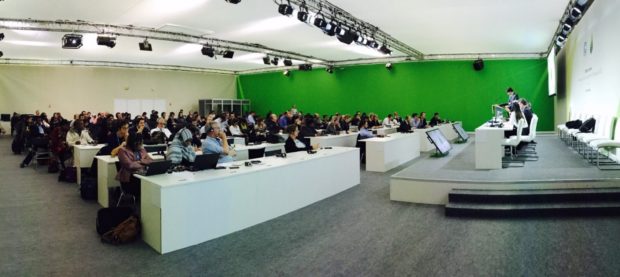We have much more to do and your continued support is needed now more than ever.
NWF Hosts Deforestation Events in Paris

The National Wildlife Federation’s international team focused on a key piece of the negotiations – the “land sector” – which plays a large role in emissions from deforestation and agriculture, carbon sequestration (forests are able to store carbon pollution), and wildlife habitat. Beyond our work to highlight the land sector’s importance in the agreement, we participated in a number of side events that surrounded the COP.
NWF held two main events along with several co-sponsors to showcase zero-deforestation agriculture and make clear the importance of the land sector. The events discussed how progress has been made and how private and public sector initiatives can work together to decrease deforestation.

Zero-deforestation Commodity Supply Chains: Linking Corporate Actions with REDD+

Our panel, co-moderated by Helen Crowley of Kering Group and our own David Burns, was made up of representatives from the private sector, including Walmart Brazil, Kering Group (the parent company for a range of brands, such as Gucci, Puma, Volcom, etc.), and the Consumer Goods Forum (a group of 400+ companies), as well as a state government representative from Brazil and a United Nations Environment Programme Goodwill Ambassador.
This combination of private and public sector actors examined the successes of voluntary private sector actions for eliminating deforestation in agricultural supply chains, such as certification, roundtables, and moratoria on sourcing products from recently deforested areas, concentrating on major commodities such as soy, palm oil, and cattle. They then discussed the ways in which private sector activities can create synergies with government actions such as law enforcement and forest conservation under programs like Reducing Emissions from Deforestation and Forest Degradation (REDD+).
Deforestation-free Agriculture: Converting Pledges into Action
NWF’s second side event took place Tuesday, Dec. 8 in the “blue zone” of the COP where attendees must be badged by the United Nations. The co-hosts – NWF, SNV Netherlands Development Organization, and the Rainforest Alliance (RA) – each had a speaker on the panel alongside representatives from Walmart Brazil and the Ministry of Foreign Affairs of The Netherlands.

This discussion, like the prior side event, examined the role of certification and moratoria in decreasing deforestation. Speakers noted that “first-mover” companies (those that are the first to take these initiatives) need to incentivize others. A zero-deforestation impact is only achievable through working with all companies and smallholders.
The event also examined the lessons learned from “landscape-level approaches” which involve having a well-planned mosaic of production and conservation areas across a large area of land to provide social protections while conserving important ecosystem services. In this case, one example of a “landscape-level approach” is combining shrimp farming and mangrove conservation. Speakers supported the need for government action to provide enforcement at the sub-national level (i.e. state or provincial level) to increase the chance of success for these voluntary private sector actions.
Dr. Nathalie Walker, the National Wildlife Federation’s Senior Manager of Tropical Forests and Agriculture, presented how the Brazilian Soy Moratorium dramatically decreased deforestation in the Amazon driven by the expansion of soy farming. A voluntary initiative implemented by the private sector since 2006, the Moratorium has been five times more effective at stopping deforestation for soy than government policy alone.
NWF supported continuation of the moratorium last year, when soy traders threatened to end it. Dr. Walker received several questions from the Dutch government and civil society members in the room about how private sector action can support government policies in this endeavor. This topic is a central component of NWF’s international work, and the active discussion between panelists and the audience continued well after the end of the formal event.

Throughout COP21, the ministers of many countries called for inclusion of forests in the agreement, and last Saturday, the COP adopted an ambitious agreement that included a whole section devoted to conserving forests! This is an incredible step forward. Yet, a lot of work remains to be done to implement the ideas of the Paris Agreement and halt climate change to protect people and wildlife globally.
Join NWF in thanking President Obama and Secretary Kerry for supporting an ambitious and fair climate agreement that charts the course for limiting dangerous climate pollution and ensuring protections for people and wildlife. Please retweet and favorite the following tweet:
Thank you @POTUS & @JohnKerry for supporting an ambitious & fair #ParisAgreement at #COP21. https://t.co/Ve9cD0mKXY pic.twitter.com/5ct9CI03oL
— Wildlife Action (@wildlifeaction) December 16, 2015




















